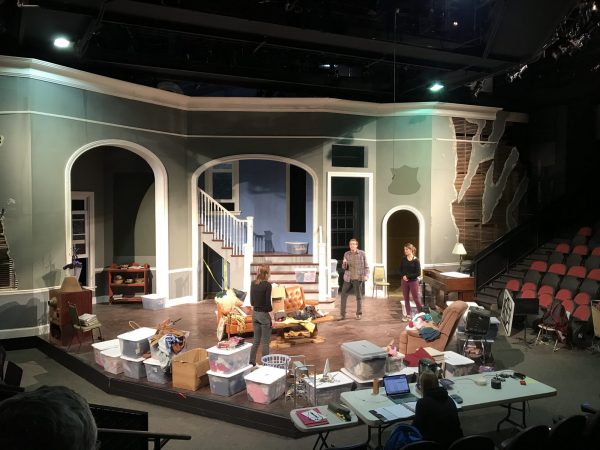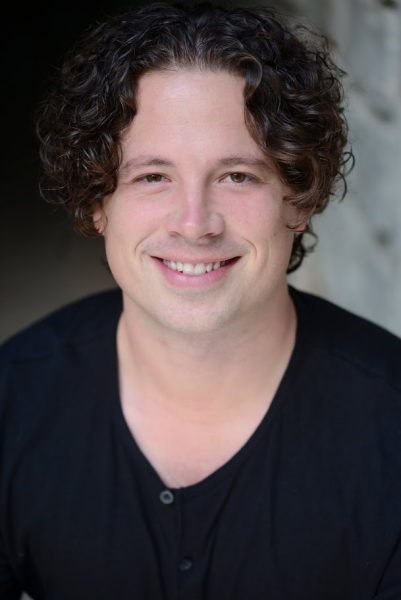 "Light abandons us and a darkness replaces it."
"Light abandons us and a darkness replaces it."
Instantly, a billion cicadas begin trilling in the dense, velvety void. ~ Prologue, Appropriate by Branden Jacobs-Jenkins
Drenched in historic and relevant themes dealing with race relations and suppressed emotions, Colorado State University Theatre’s daring play is fairly new and being performed in the region for the first time; the play opens on Feb. 16 and runs through Feb. 25 at the University Center for the Arts.
Originally directed by Theatre Professor Garrett Ayers’ mentor, Liesl Tommy, Appropriate premiered in New York just three years ago and won the 2014 Obie Award for Best New American Play.
“I asked Liesl for the script because it had a huge buzz and had won all of these awards. I was immediately taken with it when I read it, and when I proposed it for the [CSU] season selections, the students loved it too,” said Ayers while chatting over coffee at the Wild Boar Café with Mike Solo, creative director for the School of Music, Theatre, and Dance, and me.
CSU Theatre’s latest production deals with race in a contemporary way, but with an all-white cast. At a university where ethnic diversity is a challenge, Appropriate was a “big draw in that we can put on a play that deals with race with our student population,” explained Ayers.
Parallel Plays
Amidst the overarching theme is a beautifully dramatic script that echoes the 20th century writings of Arthur Miller, Sam Shepard, and Edward Albee, which the playwright, Branden Jacobs-Jenkins, has described as a collage inspired by their work.
“The reason this play is informed by them is that you have a naturalistic play running parallel to a symbolic play,” Ayers said. Particularly reminiscent of Albee’s method, the audience will receive an abundance of value from the dialogue, but “the set, characters, the sounds of cicadas, and staging are also representative of larger themes and symbols that make it more complex and layered.”
As one of the largest sets ever created in the University Theatre, the play’s setting is a plantation house, which not only represents the family’s heritage but is symbolic of America itself. “As we are zooming in and zooming out on the house, we discover intense human themes are there and are going to come out exponentially as we dig into them,” said Ayers, setting the basis for the rest of the conversation.
In the play, the Lafayette family gathers at the decaying family plantation in Arkansas to settle their father’s accounts, making a disturbing discovery about the deceased patriarch’s activities. The dual meaning of the play’s title constantly flips between adjective (suitable) and verb (to take for one’s benefit) as the finding unleashes a series of explosive confrontations between the estranged adult children.
Collective resentments and buried offenses
In preparation, Ayers had his cast do improvisational exercises around their family fights, recreating events at the Thanksgiving dinner table or a sister’s bachelorette party in Vegas. “We got to the straws that broke the camel’s back and buried offenses where these things, slowly over time, created resentments,” said Ayers about his approach.
Likewise, collective resentments spanning our country’s 400-year history have created a similar state of rage and Appropriate examines this difficult emotion. “How do we own up to things and apologize? How do we own up to other grievances and the wounds we’ve caused?” asks Ayers.
While Appropriate doesn’t offer solutions to race relations, Ayers thinks it is honest about the obstacles and challenges in categorizing them. “Jacobs-Jenkins gives us a window into potential ways that we can start the process, but he doesn’t give easy answers. And I think it starts with ownership of, and atonement for, the past. We can’t begin to fix these things without acknowledging it.”
Ayers believes dialogue is the vehicle to healing and hopes patrons will look in the mirror and start a discussion. “This process has invited me to ask myself where are the parts of my life where I can be more aware, empathetic, and walk in other people’s shoes. When am I being defensive? Where can I apologize? When can I be better with my children, myself, and my partner? It is a dialogue,” Ayers said earnestly about the process of self-revelation.
Ayers admits that he becomes most excited about directing plays that scare him. Although the play opens in a few weeks, he remains diligent about staging a play about race with an all-white cast, and a white director. “Am I going to present this play in a way that is myopic with tunnel vision, or hold myself accountable as much as the country, the elite, or obvious targets?” he worries.
A Place for Rage and Vulnerability
That responsibility drove an ongoing three-dimensional analysis of all of the play’s aspects for the director. Over winter break, Ayers read Fates and Furies by Lauren Groff, a novel about female rage that ended up influencing the production. “After reading the book about the invisible and intangible rage that women have to live with, I realized [that Appropriate] isn’t just about race, but about deep, primal rage, and the inability to express it.” The climax of the play is the family fight where there is the opportunity for articulating individual grievances, but no one knows what to do with their rage.
If Appropriate scrutinizes aspects of female rage, it equally studies male vulnerability through an ongoing interplay between anger and peace, openness and oppression. “It is about the barriers to becoming fully human. What does ‘being a man’ or ‘being a woman,’ or the roles of mom or dad, really mean? Many of these labels, and the expectations attached, limit and restrain our capacity and potential. We’ve made strides but have a long way to go where people feel safe to be fully human.”
As Ayers expects the play to be a catalyst for dialogue about race relations, he also hopes it spurs discussion about how rage and vulnerability can be experienced in a safe place where people aren’t judged or punished. “In the play, people are punished for not having the tools for expression and it comes out as dysfunction.”
A Challenging Process
Appropriate may contain difficult content, but faced production challenges as well, one being the risk of casting students as 40-year-olds. Without the age-linked costumes of a period-piece, or the character recognition of a well-known story, Ayers wondered if they could pull it off. “We are baby-faced…maybe there’s a part of the audience that won’t buy it, but I think we lucked out.” Many of CSU’s student actors read more mature and Ayers feels the cast is believable as a family of different ages. “The look was a lot more important in this show because it is a family,” he added.
Although rehearsals started earlier in real-time than most CSU productions, the University’s winter break interrupted the process. “It’s a give and take having [the script] longer, but with more breaks,” explained Ayers, who likes this time slot in the season the best as it mirrors his background. In his seminal experience as an intern with the Wooster Group in New York early in his career, it was common for the company to work on a production for up to two years, with people coming and going to other projects. “It isn’t a continuous, self-contained process, but you get to live with it, and it becomes richer as you live with it, research it, reconsider it, and work on lines,” said the experienced director. “The extra time is a blessing, not a hindrance, and gives the work, and the actors, time to ripen.”
In addition to the extra time, improvising the family fights at the start created a unique level of role ownership and development by the actors, who have become less quick to judge their characters through the process. It’s essential that the audience cares about each character and finds humor in the story through them. “We’re intentionally leaning into the surprises and what’s less obvious to create three-dimensional characters,” he said.
The Painful Side of Funny
Until this point in our conversation, nothing about Appropriate sounded especially funny and Ayers explained. “I read a quote where humor is a direct way to self-discovery, which is an indirect way to catharsis.”
Insistent that they aren’t manufacturing its existence in the show, humor strategically balances out the heavy aspects because it isn’t expected. “It makes the drama more compelling and you can stand to watch the really hard things as it fleshes out everything else and it feels more human.
Ayers hopes the play positively shapes the audience. “It’s such a well-written play with bottomless themes and elements.”
See Appropriate by Branden Jacobs-Jenkins at the University Center for the Arts with nightly performances at 7:30 p.m. on Feb. 16, 17, 22, 23, and 24. Matinees are on Feb. 18 and 25 at 2 p.m. Tickets available at csuartstickets.com. For mature audiences only.
Kids Do It All Trouper Has a Role
Eight-year-old Adrian Ayers is pumped to be in Appropriate. After two summers in Kids Do It All, CSU Theatre’s annual summer theatre camp, he was more than willing to be the play’s huge distraction. When asked by his dad, Director Garrett Ayers, to participate, he said, “I get to run around and make mischief? OK!” In the role without any lines, young Ayers terrorizes everyone, causing chaos with his toys and noise and enjoying every minute. “We picked the "Bop It" as the most annoying toy, and the cast cannot beat him at it,” laughed the director.
“It is great to work with your kid, and it’s neat for him to get a glimpse into my life,” said Ayers. “And the cast has really embraced him!”



